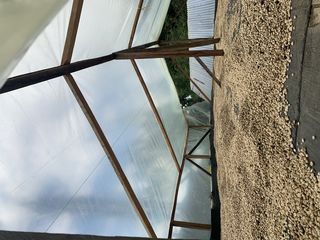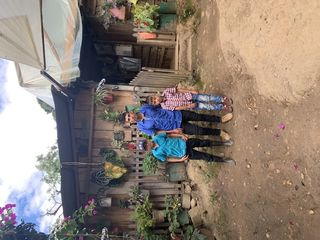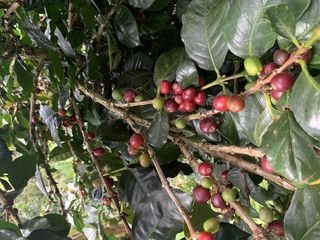January 2021
Feature #27
What a way to start a new year! We absolutley love Vanguard Coffee Co and their committment to specialty coffee as a whole. Back in June 2020 they helped us help the families of Nyabihu District, Rwanda with coffee from VUNGA CWS for our fundraiser at The Village Snob (Not to mention fundraising of their own) through a Go Fund Me set up by our mates Raw Material and Muraho Trading Co.
Our January collaboration took us back to Tolima, Colombia, for another Castillo. This time our first anaerobic fermentation.
During January we explored:
THE PRODUCER:
This particular lot is an exceptional example of how a washed Colombian coffee can taste. Beautifully clean, sweet and complex with great balance. Grown by William Aviles at Finca El Mirador. This coffee is picked following strict ripeness criteria, to ensure maximum sweetness is developed in the coffee cherry before harvest. The coffee, once picked is subjected to a dry anaerobic fermentation for 35 hours with the pulp on. The cherries are then pulped and gently washed and dried on raised drying beds until the ideal moisture content is reached. William Aviles produces only organic coffees, and since 2014 has been a member of AGPROCEM Co-Operative. William has been producing excellent quality microlot coffee since 2016, and these days 80% of his production achieves microlot quality (SCA 86.5-88 points) which has doubled his net profits. Words by Vanguard Coffee Co.
FERMENTATION:
Fermentation may not be the first thing that comes to mind when you think of coffee, but its a process that happens in almost every coffee lot to some degree or another. Fermentation is a naturally occurring chemical reaction that takes place between the sugar and water, substances that are present in abundance in coffee cherries. A combination of yeast, bacteria and microorganisms break down the sugars, which in turn typically generates heat. Anaerobic fermentation takes place once the cherry has been pulped, then placed into a sealed, oxygen free environment (differing from carbonic maceration, which takes place while the cherry is intact). For natural processed coffees, the fermentation takes place using moisture within the cherry itself and occurs throughout the drying phase. However for washed processed coffees, it happens during the “washing” phase, with the pulped cherry being submerged in water for hours, sometimes days at a time, before being laid out to dry. It is possible in some circumstances of high humidity for ripe cherries to start to ferment pre harvest (while on the tree), providing yet another variable for producers to consider and monitor. In recent years there has been a greater focus on the power of fermentation to influence the cup profile. Like all aspects of coffee, controlling the fermentation process enables more predictable outcomes and allows for manipulation towards favourable cup profiles which in turn play a part in cup score and ultimately result in the potential to fetch higher prices. But with reward comes risk, over fermentation leading to loss of cup quality or general spoilage.
AGPROCEM – A COOPERATIVE:
Founded in 2013 AGPROCEM is a small cooperative dedicated to the commercialisation of specialty coffee, in a sustainable and ecologically friendly manner. Led by coffee entrepreneur Endinson Vaquiro Mendoza, there is a strong focus on direct trade and providing better quality of life for farmers. By adopting accreditations such as Organic and Fair trade certifications, AGROCEM believe the can better guarantee the quality of their product and reach national and international markets for their members. Through an alliance with Specialty Coffee Plandas SAS, training is offered to boys and girls in quality and analysis processes, part of the core belief that coffee farming can be a profession generational technological changes. Located in Vereda Montalvo, Planadas, the organisation is collectively governed by its 50 members, who's cumulative land holding is just over 100 hectares. In a region that has recent history of violence and isolation, AGPROCEM is making its mark as a symbol of progress and hope as they work towards putting Tolima on the top of the map for Colombian coffee. They hold the vision of being a leading company by 2025, by providing technical services to a mix of for profit and not for profit organisations while also being a source of employment and support for small producers. Through promoting small producers, their families and entrepreneurship they are helping to contribute to the overall development of the country.
TASTING NOTES:
Country: Colombia
Municipality: Tolima
Department: Planadas
Producer: William Aviles
Farm: Finca El Mirador
Altitude: 1800-1950 MASL
Varietal/Species: Castillo
Process: Washed
Rainfall: 1600-1800mm
Tasting notes: Plum Caramel Chocolate
RECIPE:
Recommended method: V60 (Plastic)
Ratio: 1:16.5 Brew time: 2:45 – 3:00 minutes
Temperature: 95 degrees
Method: Dose: 15g
Bloom: 50g 30-45 seconds Swirl and stir to break up clumps and dry spots
First pour: 100g, allow to drain
Second pour: 100g water, followed by gentle swirl.
Photos courtesy of Cofinet.
|
© Copyright Derelict Coffee Roasters |




